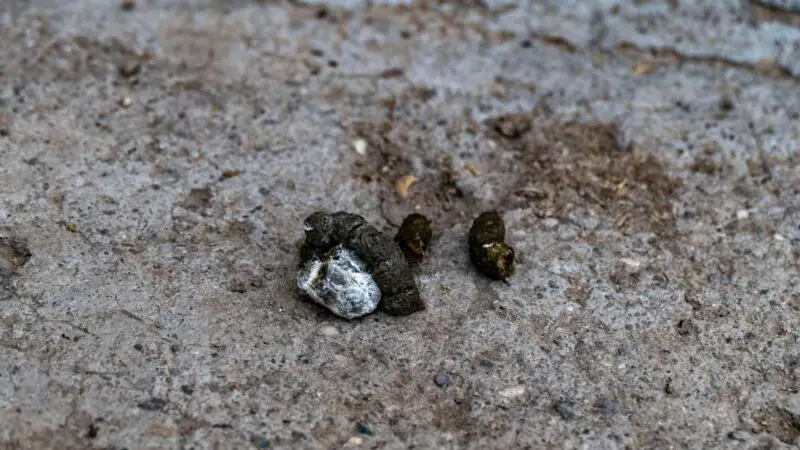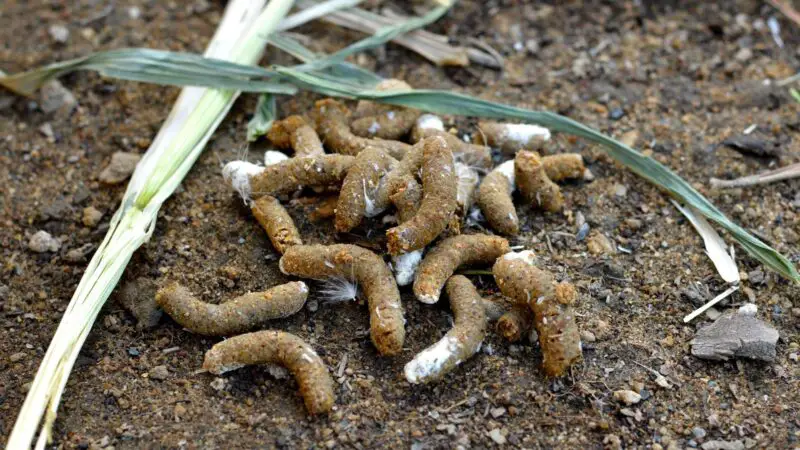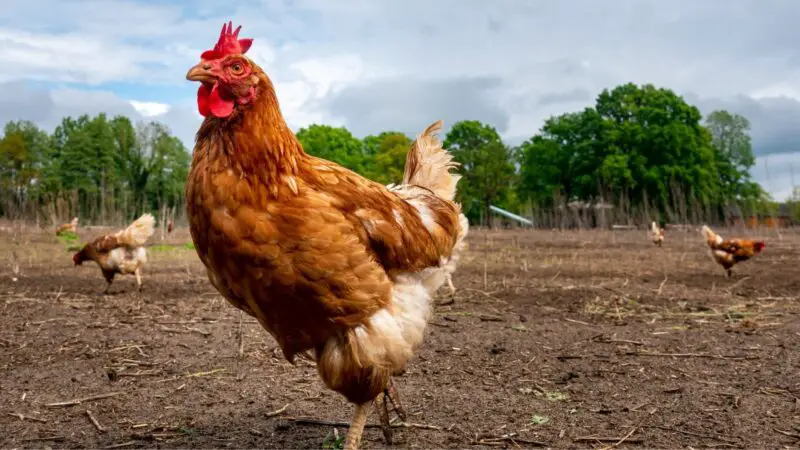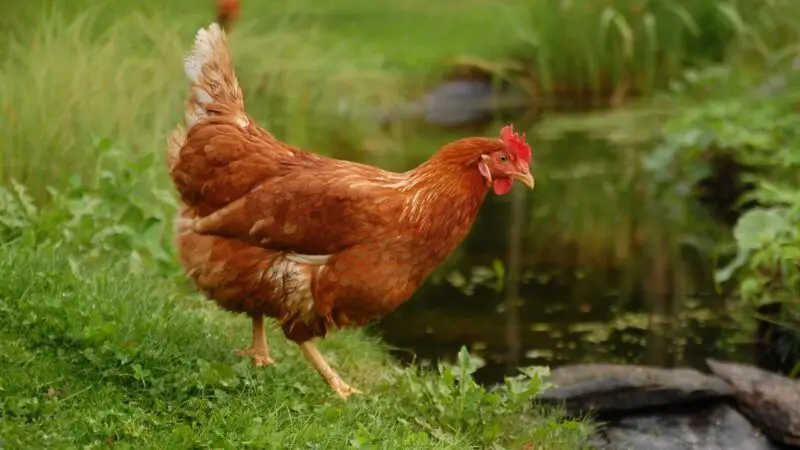Though chicken poop does not make for the best compost material, it can be used to help grow some of your favorite plants in your garden. The trick is knowing how much to use. This article will talk about all you need to know about chicken poop, its benefits, and its uses.
Chicken poop is good for gardens. Before usage, it needs to be aged or composted. Raw chicken dung, however, can burn and harm plants. The fact that chicken manure is “hot”—possibly the “hottest” manure—is the only true “downside” of utilizing it in the garden. This means that, when consumed fresh, its notable high nitrogen and nutritional content may appear to be a problem.
Additionally, it should be mentioned that chicken dung can harbor bacteria and diseases like salmonella. On the other hand, chicken manure is safe to use around plants, people, and pets when composting is done correctly since the process eliminates relevant disease-causing bacteria. Read on to learn more.
Chicken Poop’s Colors and Their Implications

When they are still fresh, healthy bird droppings and feces have no stench. Feces odor is frequently an indication of an infection in the digestive system. An infection caused by bacteria or yeast is the most typical. It’s crucial to understand what healthy chicken droppings look like in addition to what a healthy chicken looks like.
When it comes to chicken poop, there is an incredibly wide range of normal, which many people find surprising. As a result, it’s crucial to become familiar with what is typical for the chickens under your care so you can recognize anything that seems out of the ordinary.
Related: What Does Chicken Poop Look Like? | All You Need to Know!
What Can Chicken Poop Color Tell You?

The appearance (colors and textures) of these chicken poop can vary; some can be brown, green, yellow, maroon, or even black. It all relies on the birds’ nutrition, their growing season, the time of year, whether it’s colder or hotter, and their general health. You can tell if something is happening with your chickens by looking at their manure.
Yellow Chicken Poop
The presence of intestinal parasites, an illness, a diet that is excessively high in protein, or kidney disease can all be indicated by yellow, frothy, or greasy-looking chicken poop. This can be a sign of coccidiosis, salmonellosis, or intestinal worm (Fowl typhoid). Other factors include eating foods like strawberries, tomatoes, oats, and corn.
Yellow chicken poop is usually a sign of a digestive problem. If your chicken poop is yellow, it’s probably not digesting its food very well. This can be caused by a variety of issues, including:
- Lack of nutrients in the feed
- Vitamin or mineral deficiencies
- An intestinal parasite
- An intestinal blockage
- Inadequate water supply
Green Chicken Poop
Green chicken poop is usually an indication that your hens are eating a lot of greens in their diet, so this is good news! If you’re seeing green poop, it could mean they’re eating lots of weeds or plants that aren’t part of their normal diet. Green poop can also mean that they’ve been sick recently—but if you see green poop regularly, that’s not necessarily an indication that your hens are sick.
Additionally, green chicken poop can tell you whether they’re getting enough food to eat. If you notice that your hens’ poop has turned green in the last few weeks or months, it may be because they haven’t been eating much grass or other green food lately. You’ll want to start giving them more greens and see if this helps.
Black Chicken Poop
Black chicken poop is a sign of illness in chickens. It’s not a cause for alarm, but it can indicate the presence of disease and other issues that would be serious for your chickens if left untreated. It is caused by blood in the stool. This can be caused by various conditions, including a variety of gastrointestinal parasites. It may also be caused by an infection with bacteria, such as salmonella or campylobacter.
Infections like this often produce black poop because the bacteria kill off the pigment in the chicken’s gut, resulting in black poop. If you’re seeing black chicken poop regularly and you don’t have any known issues, you should speak to your veterinarian about what might be causing it.
Orange Chicken Poop
The most common cause of orange chicken poop is food poisoning. This happens when your body experiences an allergic reaction to a food, and your immune system reacts by releasing histamine. The result is that you have diarrhea and vomiting.
Another possibility for orange chicken poop is a parasite. Parasites are tiny organisms that live in the digestive tract of humans and animals, and they can either be beneficial or harmful to the host. One of the most common parasites found in chickens is Giardia lamblia, which causes diarrhea and bloating.
A particularly nasty parasite might also cause your chickens to poop orange (or yellow) as a defense mechanism against predators like snakes, foxes, hawks, owls, or other birds of prey – especially if they’re not eating well. Parasites are key players in chicken nutrition because they help prevent malnutrition while providing extra nutrients in their feces, which helps them grow faster.
Brown Chicken Poop, but Runny
Brown chicken poop means that your bird is eating a healthy diet. It means that your bird is eating well and has plenty of nutrition in its diet. The color of the poop will vary depending on what they eat. But if you notice it’s brown, you can rest assured that they’re getting enough of the right things to keep them healthy.
Another common sign that something is wrong with your bird is when its poop isn’t brown—it could mean it’s not getting enough nutrients or minerals in its diet. In some cases, this is due to an illness or disease caused by bacteria or parasites in the bird’s environment; other times it can be caused by an imbalance between the amount of protein and fatty acids in its diet.
Normal symptoms of diarrhea include brown yet runny chicken poop. The most common cause is drinking more water, but bacterial illnesses might also be to blame. Brown, runny feces may indicate E. coli. It’s more likely, though, that the birds consumed vegetables high in water content, such as cucumbers or zucchini.
White Chicken Poop
White chicken poop is often a sign of a problem with the digestive system. The color can also be caused by a bird’s diet, which may be high in white corn and wheat, or when they eat too much processed food. This can be caused by a variety of conditions, including worms and parasites.
If you notice that your chicken’s poop starts to turn white, don’t panic! This is just a sign that the chicken has an infection or other health issue. If you keep an eye on your chickens and their health, you should be able to tell when something isn’t right with them. You should also make sure that they are getting enough food and water every day to avoid malnutrition.
What Is Normal Chicken Poop?

Normal chicken poop is a brownish, semi-dry substance that looks like a wad of cotton. It’s normally formed in the gizzard and ingested and passed along to the rest of the bird’s digestive system, where it is broken down and removed through the cloaca or anus.
Normal chicken poop varies from bird to bird, but it’s usually a solid, soft stool. It can be yellow, orange, or brown. The consistency also varies—some birds poop more like pellets than others. In some cases, normal chicken poop may be green in color and look like grass clippings. This is a common side effect of eating foods with high amounts of plant matter.
How to Tell if Your Chickens Have Worms?

If you’re looking to know if your chickens have worms, there are a few simple ways to tell. One way is by checking the feathers of your flock. Worms cause clogged feathers, and in this case, it will be easy to see from the way the feathers look. If you notice that your chickens are having trouble flying, this could be an indicator of worms.
Another way to check for worms is by looking inside the cloaca area of your chickens. This is where they poop, so if you notice any signs of diarrhea or blood in their poop, this can be an indicator of worms too!
You can also check their eyes and ears for signs that they have worms. This can be done by simply taking them into a room with bright lights and shining them directly into their eyes or ears after they have been exposed to light for a while (about 30 minutes). You should be able to see if there is any inflammation around their eyes or ears as opposed to normal skin coloration around these areas.
What Other Health Problems Can Chicken Poop Reveal?
The first thing is an increase in the number of droppings. If you see more droppings than usual, then this could mean that the chickens are getting sick or have some sort of parasite. This can also happen if there’s been a change in diet or if a new member of your flock has joined them.
Another thing that may show up in chicken poop is the blood in it. This indicates anemia or an illness that requires medical attention right away. You should also check to make sure there aren’t any other symptoms such as coughing or lethargy—these could indicate something even more serious.
Chicken poop can reveal a lot about your pet’s health. In addition to the usual concerns, chicken poop can reveal issues with worms, coccidiosis (a common intestinal parasite), and other conditions. You should also be on the lookout for signs of kidney or liver disease if your chicken is passing blood in her poop.
Maybe you are not the biggest fan of using chicken manure in your garden, but if used correctly, it can increase produce and growth yield while also saving money on additional fertilizers or chemicals.
Not only does it add nutrition to the soil, but it also provides great health benefits to your garden with its rich supply of proteins and nutrients such as nitrogen, phosphorus, and potassium.
But before you get excited about all these factors, bear in mind that not every type of manure can be used on your plants. So if you’re planning to use them, make sure they’re organic enough, or you might have some trouble growing those tomatoes later on.
Related: Chickens & Goats | Simple Guidelines for Safe Coexistence!
